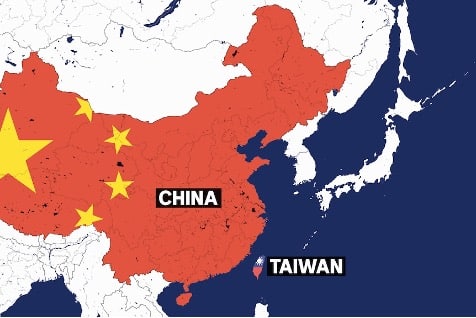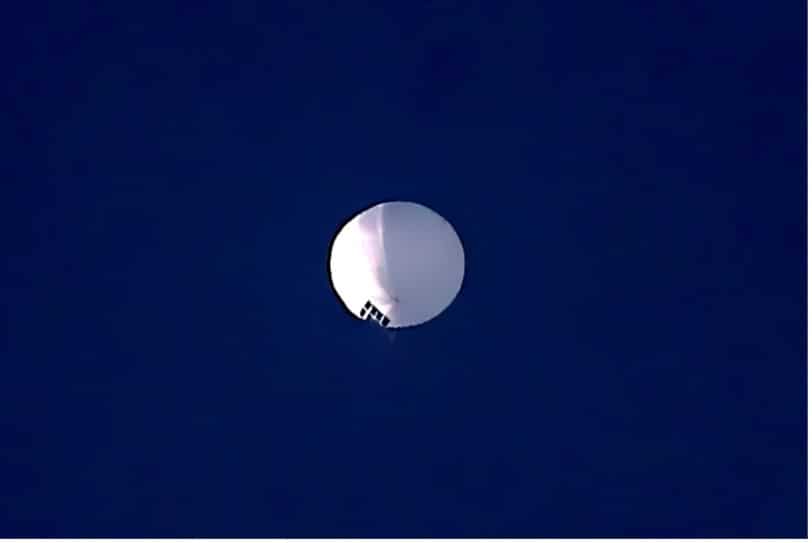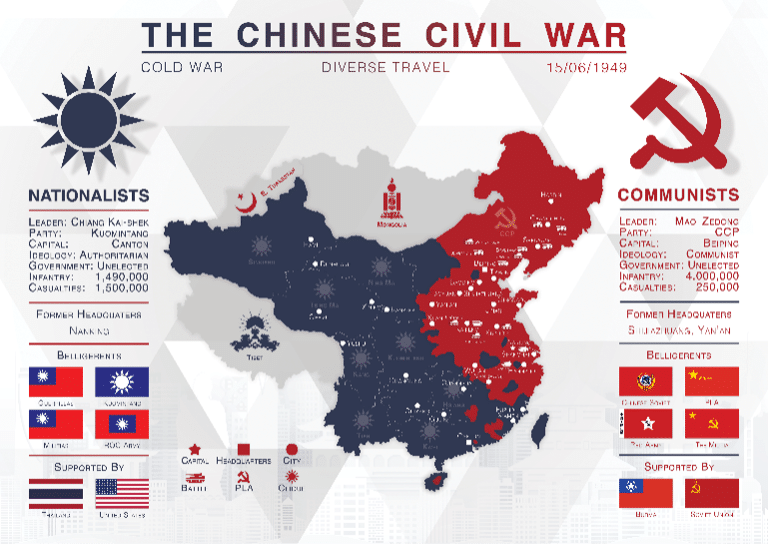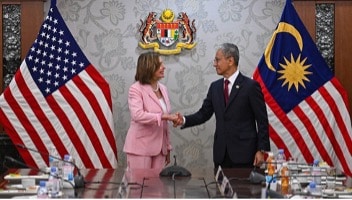The Porcupine Strategy and US support would make taking Taiwan a pyrrhic victory; but an invasion cannot be ruled out.

It is with a sense of trepidation that I write this article. Just before the Silicon Valley Bank/Credit Suisse debacle, I noted that another black swan event may be imminent. Now it seems that Taiwan may be next.
Inflationary peak?
With US CPI inflation falling to 5%, it’s easy to believe that the worst of the pandemic hangover is over — while much of the residual inflation is baked into the wage-price spiral, many analysts consider that things will now be getting back to ‘normal.’
In the UK, CPI inflation stands at 10.4%, but the OBR thinks a return to under 3% is plausible by the end of the year, and the IMF thinks that drastic interest rate cuts from the current 4.25% to closer to ‘emergency’ rates could be in the offing.
I think this would be another catastrophic mistake, but really that’s neither here nor there. Long-term monetary policy predictions always exclude black swan events, as by their nature they cannot be predicted. However, having covered many such events in my freelance career, I can’t quite remember there being so many in a row.
Let’s list them off — the pandemic crash, the inflationary crisis, the Ukraine War, the Truss mini-budget, the banking mini-crisis…it turns out you can’t print trillions in currency without causing an inflationary problem or two. And you can’t fix inflation without breaking something important too.
It’s interesting to note that BoE Governor Andrew Bailey is considering raising the £85,000 FSCS insurance limit and has promised to stop quantitative tightening if adverse effects appear. But simultaneously, he’s playing down the banking mini crisis at the IMF spring meeting to pave the way for more rate rises.
Clearly, the central banker wants to both have his gateau and eat it. It’s also worth noting that the official inflation target of both central banks is around 2%. The current inflation figures are nothing to celebrate — yet.
But this is all moot if the string suspending the Sword of Damocles over the global economy snaps.
Will China invade Taiwan? Background politics
Let’s be clear — this is beyond complicated, and I am no military expert. That being said, tensions are escalating.

First, there’s deteriorating Sino-US relations. For balance, goods trade between the two superpowers hit a record $690.6 billion, and the US trade deficit with China expanded by 8.3% to $382.9 billion in 2022. Despite the rhetoric, both countries rely on each other for economic growth; and it’s the ‘miracle’ of growth that has allowed Xi to rise from political outcast to Premiership of the CCP.
But problems have been brewing for a while —
- regulatory spats over US-listed Chinese tech stocks
- ongoing arguments over the origin of covid-19
- the economic power of the BRICS nations, perhaps planning a new global reserve currency underpinned by commodities including gold
- the prospect of a TikTok ban with bipartisan US political support that it constitutes a Chinese state weapon
- tensions over Chinese ambivalence of Russia’s invasion of Ukraine
- Chinese spy balloons
- the US ban on exports of chipmaking products and advanced semiconductors to China
- and more…
With China buying Russian oil and the US supplying Ukraine weapons, the battlefields of the Donbass are coming close to approximating a proxy war already. China is proposing to ban the export of REEs to the US in retaliation to the US chips ban — Mkango will be happy.
But the key consideration to balance is that Xi must achieve continued economic growth. It’s all that matters, it’s what keeps him in power.
While an incursion on Taiwan might be a good distraction for citizens from domestic problems, the likely western sanctions would almost certainly crater growth, which is already becoming a problem given the lingering aftereffects on the population caused by the one-child policy and pandemic scarring.
Taiwan history and comparison to Ukraine
Clearly, it’s not possible to cover everything, but there is a strong temptation to compare Ukraine to Taiwan. After all, both are contested areas with strong support from the west that might end up being annexed by larger powers.
However — other than serving as a reminder to China that invasions do not always go as planned and come with very real consequences — this is where the similarities end. Again, this is only personal opinion.
Consider demographics. Before the Ukraine War, Ukrainians and Russians saw each other as the same people. Indeed, many still do. In the UK, it’s akin to the English and the Scots — there may be banter and division, but the idea of fighting each other in a war (today) is absurd.
However, Ukraine had already been fighting Russia in the Donbass and previously Crimea throughout a horrendously complex history. This isn’t the same situation in China and Taiwan (or officially, the Republic of China). It’s worth noting that many ‘Russians’ fighting Ukraine are either native to the territory, from far-flung rural areas, or are mercenaries from abroad.

Taiwan (ROC) was found in 1912 — at the time, Taiwan was under Japanese colonial rule as a result of the 1895 Treaty of Shimonoseki, by which the Qing ceded Taiwan to Japan. This explains the Japanese influence over the island.
The ROC government took over the affairs of the island after Japan’s defeat at the end of WWII and relocated to Taiwan permanently while fighting a civil war with the Chinese Communist Party in 1949. Over the next few years, 1.2 million Chinese mainlanders relocated to the island. And since then, the ROC government has exercised sovereign control over Taiwan and several smaller surrounding islands.
In CCP psychology, the Taiwanese government and by extension the people occupying the island are traitors to the country.

It’s interesting to compare this attitude with the CCP’s perception of Hong Kong inhabitants — the Party has clamped down on the one-country two-system policy, but despite the lack of Mandarin and strong western influences, China’s politicians have consistently advocated that Hong Kong people are ‘Chinese,’ even if those people have little in common with mainlanders.
It’s even importing mainlanders, changing the school curriculum, and clamping down on long-held HK freedoms to make the island more Chinese. This can easily be interpreted as heavy-handed brutality, but it’s also true that the CCP genuinely perceives Hong Kong inhabitants as Chinese and wants them to return to its ancestral roots.
The Taiwanese are not viewed in this favourable light. Hong Kong was always going to be returned to China in 1997 — the condition of the 99-year lease signed after losing the tea and opium wars. The Chinese were patient, happy to wait to reclaim the land. Meanwhile, Taiwan is viewed as stolen territory.
This means that the CCP would not refrain from an attack out of a sense of fraternity — though this is just my perception.
Taiwan War: geography and defence
Geographically, the two situations could not be more different.
Ukraine is a massive, flat, landmass which is relatively easy to attack. It has over 1,400 miles of border with Russia, and another border with Belarus. And Russia wants the country to extend the Russian sphere of influence, and to gain its minerals wealth, including Ukraine’s tremendous iron, oil, and gas reserves. Flattening cities and killing civilians doesn’t matter to these military objectives.

Taiwan is about 15% of the size of the UK — or half the size of Scotland. The main island — Formoza — is over 100 miles from the mainland and is surrounded by several smaller island outposts. There’s a mountain range dividing the island in two, and the country has built massive defences into the mountains, on the coast, and on the smaller islands.
Until the 1970s, the idea was for Taiwan to retake mainland China, but its foremost mission nowadays is to defend the islands against the People’s Liberation Army of mainland China. Taiwan has circa 200,000 full-time personnel, 2.3 million reservists, and a gigantic pool of conscripts as all 18-year-old males must serve one year of compulsory military service.
For decades, Taiwan has adopted a ‘porcupine strategy’ of widely dispersed smaller weaponry which would make any invasion a pyrrhic victory. While China would almost certainly win any conflict — it has circa 2 million active soldiers and spends tenfold more on its military per annum — the end result would likely be a decimated Chinese military and a sanction-weakened economy.
In addition, the resources of Taiwan are not in strategic land acquisition — though it is an important US outpost — but in its semiconductor factories. By some metrics, the small island nation manufactures over 60% of the world’s semiconductors and over 90% of the most advanced ones.
It’s striking that the US has passed the CHIPS act — clearly to gain independence from this dependency — while Japan’s Finance Minister Shunichi Suzuki just made a cryptic warning that having supply chain concentrations in ‘certain countries’ is not desirable for economic security. This can be interpreted in several ways, given China’s lockdowns.
But if China were to invade, it would sacrifice hundreds of thousands of soldiers and much of its international trade — to win a shell of an island with no useful resource. Winning would require destroying the semiconductor factories that make Taiwan economically valuable.
Of course, not every war is fought for rational reasons, and anger with the ROC government may be enough by itself.
Would the US support Taiwan?
This depends on what you mean by ‘support.’ Officially, the US has long adopted a policy of ‘strategic ambiguity,’ whereby it will neither commit to nor rule out defending the country, instead only considering all threats to Taiwan as a matter of ‘grave concern.’
Several US politicians are advocating that the country should publicly state full support for Taiwanese defence, but this would risk angering China into making a rash decision, further inflaming tensions, and could even lead to the start of WWIII.
There’s a reason that neither the US nor the UN recognises Taiwan as an official country — and WWIII should not be a high-stakes poker game that relies on superpowers calling each other’s bluff.
Indeed, I think it extremely unlikely that the US would actively put ‘boots on the ground’ to engage in a fight with a nuclear power. Instead, it’s selling high precision mobile weaponry to Taiwan — including stinger missiles, M-9 drones, high mobility artillery rocket systems, and harpoon coastal defence missiles.
Have you ever played Risk? Trying to take Siam from a player holding the Australian continent is a good way to lose early on in the game.
Taiwan is a democracy and is therefore a cultural and political ally to the US, much like South Korea. A Chinese takeover would threaten regional stability, in a region that already features North Korea’s occasional nuclear hissy fits. It would also be unconscionable for the US to allow China to control or destroy the world’s semiconductor factory.

What’s clear is that as China fires up the rhetoric, the US fights fire with fire. In July 2022, Xi warned Biden in a two-hour-long call that ‘those who play with fire will perish by it. It is hoped that the US will be clear-eyed about this,’ signposting the likely reaction should then US-speaker Nancy Pelosi visit Taiwan.
In response to Pelosi’s ‘reckless’ visit to Taiwan days later, Beijing launched massive joint military exercises around the island and cancelled eight military dialogue channels with the US. Taiwan saw ballistic missile launches over the island for the first time, no-fly zones imposed, and cyber-attacks ’23 times higher than the previous daily record.’
It’s interesting to note that French President Emmanuel Macron — after visiting Xi in China — recently intoned that France should not be a US ‘vassal’ state concerning Taiwan and the potential recriminations should China invade. Perhaps given that France is currently on fire itself, he feels that domestic problems and the nearby war of Ukraine is more than enough for Europe to be dealing with.
Again, Taiwan is neither UN-recognised nor a NATO member. There is no legal responsibility for any country to defend the island from Chinese attack.
On 5 April 2023, Taiwanese President Tsai Ing-wen met with new US House Speaker Kevin McCarthy, in a show of strength that angered Beijing — but crucially, they met in Southern California rather than on the island.
In response, China launched a three-day series of even more belligerent military exercises codenamed ‘Joint Sword.’ Taiwan’s foreign minister Joseph Wu argues: ‘Look at the military exercises, and also their rhetoric – they seem to be trying to get ready to launch a war against Taiwan. The Taiwanese government looks at the Chinese military threat as something that cannot be accepted, and we condemn it.’
Meanwhile, Zhu Fenglian at the Chinese cabinet’s Taiwan Affairs Office notes that ‘the People’s Liberation Army recently organised and conducted a series of countermeasures in the Taiwan Strait and surrounding waters, which is a serious warning against the collusion and provocation of Taiwan independence separatist forces and external forces.’
China had also planned to set up a no-fly zone for three days between 16-18 April, sparking fears that war was imminent. However, Taiwan’s protestations have seen this limited to just 27 minutes next Sunday morning, and only for some of the island’s northern airspace.
Concluding thoughts
China is angered by the very existence of Taiwan — its One China Principle holds that the People’s Republic of China (the mainland) and the CCP are the sovereign rulers of all Chinese territory including Taiwan. Beijing has long vowed to unify Taiwan with the mainland, by force, if necessary, regardless of the will of the people living there — and US support for the island is viewed as a provocation.
With the world weakened by the pandemic and Ukraine War, the CCP is wondering whether now might be the time to strike. However, any invasion would be an economic and military disaster for the CCP, and the porcupine strategy would leave the Party only king of the ashes in exchange.
But China is not a predictable state.
This article has been prepared for information purposes only by Charles Archer. It does not constitute advice, and no party accepts any liability for either accuracy or for investing decisions made using the information provided.
Further, it is not intended for distribution to, or use by, any person in any country or jurisdiction where such distribution or use would be contrary to local law or regulation.
